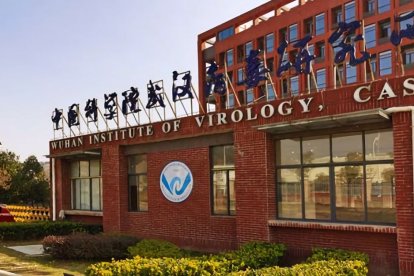Intelligence Community on COVID-19: "Both a natural and laboratory-associated origin remain plausible"
Senator Braun, who promoted the COVID-19 Origin Act, called the information insufficient and accused the director of the IC of trying to cover up for Fauci and China.

(Wikimedia Commons)
The Office of the Director of National Intelligence released the report on the origins of COVID, which compiles information from the various agencies of the Intelligence Community (IC).
The office run by Avril Haines released the report a week after the deadline set by a law signed by Biden. The COVID-19 Origin Act requires the official to report information to Congress and to the public about the beginnings of the pandemic, with the goal of preventing a recurrence and identifying the origin of the virus.
Laboratory leak or natural contagion?
The Intelligence Community (IC) has been investigating, since last March, two hypotheses about the start of the pandemic: a "natural exposure" of humans to an infected animal or a laboratory accident, specifically at the Wuhan Institute of Virology.
Three months were not enough time to rule out either of the two possible explanations, according to the report:
Opinions are divided. While five agencies believe the most likely origin was a natural contagion, the Department of Energy and the FBI lean toward the opposite theory. Other agencies, including the CIA, declare themselves unable to rule out either, claiming that "both hypotheses rely on significant assumptions or face challenges with conflicting reporting."
However, "almost all" agree that COVID-19 was not man-made, although some admit that they cannot say that it was not modified by humans, and "all" rule out that it was developed as a biological weapon.
The Chinese Army
The report devotes less than half a page to the relationship between the laboratory near the origin of the virus and the Chinese armed forces, the People's Liberation Army (PLA).
"Information available to the IC indicates that some of the research conducted by the PLA and Wuhan Institute of Virology included work with several viruses, including coronaviruses," the report acknowledges. However, it clarifies that none of the viruses studied could "plausibly be a progenitor of SARS-CoV-2." The exact viruses being studied were not detailed.
Safety measures
While stating that it is unaware of a specific biosecurity incident that led to the pandemic, the IC admits that there may have been precautionary breaches:
Information on the security level of the facility is inconclusive. Although China was improving the security of the Institute of Virology prior to the pandemic, "appropriately trained personnel" were in short supply.
In addition, the intelligence community admits the difficulty of knowing the prevention measures implemented in detail due to the opacity of the Chinese government.
Patient zero?
"Several WIV researchers were ill in Fall 2019 with symptoms; some of their symptoms were consistent with but not diagnostic of COVID-19." However, none of these cases were hospitalized. Only one researcher was hospitalized during this period, but for a non-respiratory condition.
Although some of the researchers have a history of studying respiratory viruses in animals, the agents could not confirm whether they had worked with live animals before they became ill.
China would have the information to rule out or confirm a patient zero. The IC maintains that the laboratory has blood samples and sanitary records of all its personnel, a practice that, it explains, is common in institutions where the risk of contamination is high. On this point, the report recalls the research conducted by the World Health Organization:
Half-information?
The report itself acknowledges that some information remains classified to protect the sources of information and the methods used by the agencies.
The law signed by Biden established these two criteria as valid grounds for withholding information. However, Congressmen Josh Hawley and Mike Braun had already warned Biden in a letter that he should stick exclusively to those, and not extend protection arbitrarily.
Braun was skeptical prior to the publication, and reading the final report only increased his doubts and criticism. "The COVID-19 Origin Act calls for a full declassification, not Cliffs Notes to cover for Dr. Fauci and protect China," wrote the senator, who further noted:
In addition, he recalled that the bipartisan COVID-19 Origin Act, which he promoted, established that all relevant information should be published, specifying some elements such as the names of the researchers.
One of those names was Ben Hu, according to independent reports released shortly before the Office of the Director of Intelligence released its findings. The scientist at the lab in Wuhan was likely one of three researchers who became ill with symptoms compatible with COVID-19 in November 2021.
Hu reportedly dismissed this as "ridiculous" in an email to the journal Science. The scientist maintained that he had not become ill at the time and that an antibody test he took in March 2020 was negative.
Yu Ping, another of those named, also denied being patient zero, according to the same source. The third researcher, Zhu Yan, did not respond to media inquiries.












